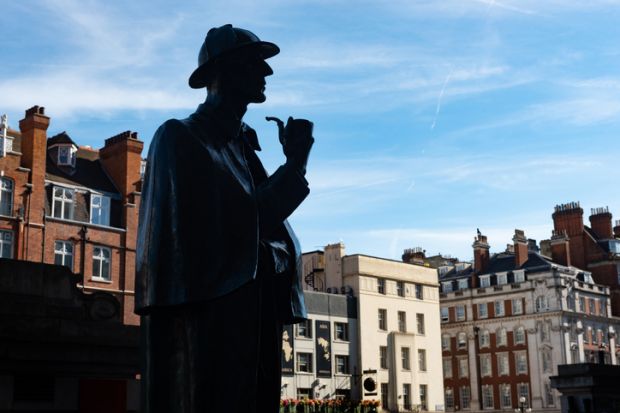Sherlock Holmes’ frequent use of anatomy, toxicology and mathematics to crack cases has seen him regarded as the quintessential Victorian man of learning.
But his “madman’s approach to science”, which rejects scholarly convention, is also an early example of anti-university sentiment that has since filtered into the popular imagination, a new study argues.
In a collection of essays exploring how the depiction of fictional characters has influenced the public perception of academia, the German scholar Jochem Kotthaus states that Baker Street’s famous consulting detective should be considered as one of a “first wave of superheroes” thanks to his use of science to fight crime, but his popularity is also firmly rooted in a now-familiar tradition that scorns “academic knowledge”.
While his sidekick Dr Watson once reports that his roommate has undertaken “eccentric experiments with blood tests and beating of corpses in the laboratories of University College London”, writes Professor Kotthaus, from Dortmund’s University of Applied Sciences and Arts, his creator Arthur Conan Doyle is deliberately vague about Holmes’ academic background.
“Holmes might have studied chemistry at Oxford or Cambridge, but…he is far from being a classically bred academic,” says Professor Kotthaus in Academia and Higher Learning in Popular Culture, noting that he is “not even entirely sure if Holmes even graduated with a degree”.
Instead, he is the “perfect example of the Victorian dilettante scientist”, who uses his “scientific upbringing, his expertise in various academic disciplines…to battle the same evil conjured by those perpetrating the crime”.
“Holmes’ lack of a doctorate or any degree brings him closer to the readers, who need someone to identify with,” explains Professor Kotthaus, who connects the character to a familiar trope found in Hollywood movies in which street smarts are lauded above traditional learning.
“A supporting character might utter a line about ‘extensive training’; the faithful companion may remark that the protagonist spent years in the wilderness or on ‘the streets’, strengthening body and mind,” he writes, adding that this “very blue-collar attitude” towards learning regards academic learning as “boring”.
Holmes is someone, writes Professor Kotthaus, who, “considering all his intellectual prowess, [still] gets down and dirty.” “His madman’s approach to science, the field trips to the morgue, the chemical and medical self-tests suggest that Sherlock is still learning,” he adds.
Recent film and TV versions – Sherlock (2010-17) and the New York-set Elementary 2012-19) – have pushed this “devaluation, phasing out or gross misinterpretation of the university as an institution, academic knowledge and higher education”, he adds.
“Benedict Cumberbatch’s Sherlock uses a variety of tools at hand to solve his cases, often the internet. The same goes for Jonny Lee Miller’s version of the character, a recovering addict, complete with his brownstone humongous wall of craziness and a variety of experiments of disputable usefulness,” he says.
“These are the postmodern iterations of Sherlock Holmes, as imperfect and as far removed from any academic knowledge as they can be.”
POSTSCRIPT:
Print headline: The final problem: did Holmes have a degree?
Register to continue
Why register?
- Registration is free and only takes a moment
- Once registered, you can read 3 articles a month
- Sign up for our newsletter
Subscribe
Or subscribe for unlimited access to:
- Unlimited access to news, views, insights & reviews
- Digital editions
- Digital access to THE’s university and college rankings analysis
Already registered or a current subscriber? Login








